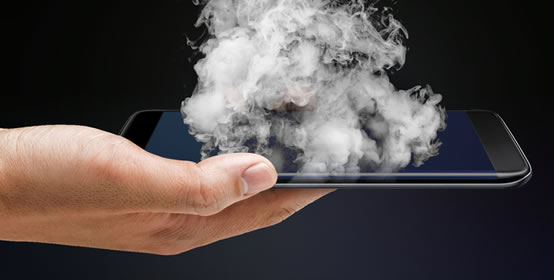
Cell phones are now one of the basic needs of people. They have become a necessity. Almost all people now have their own cell phones. They know how to use them. However, many people might not yet be aware about the risk of explosion among cell phones.
Recently, Samsung recalled its Galaxy Note 7 due to several cases of explosion. Exploding cell phones are not only Samsung's problem. There are many such cases happening with other brands of cell phones. This means explosion is not an isolated case of Samsung. There is indeed something behind such explosion that only science can explain.
Most cell phone explosions did not come from cell phones themselves. Most of the time, the batteries are the culprit. The common cause of battery explosion is when it is recharged too much. This is what happened with the Galaxy Note 7 and other brands of cell phones. On the other hand, battery defects are the primary reason.
In a cell phone's battery system, there are separators that prevent two electrodes from connecting with each other. When the separators don't work properly, it is more likely that these two electrodes will touch one another, and this will cause explosion.
When two electrodes come into contact, the electrolytes directly receive all the energy that is supposed to stay in the battery. This is unusual as it is the electrodes on the side that should receive it. Electrolytes are unstable and very sensitive to heat. When there is too much heat, electrolytes react and cause other chemicals to produce gas, which elevates the existing level of heat. And every time such chemicals react more and more gas is produced thereby producing more heat. This condition leads to thermal runaway that causes fire.
Most cell phones use lithium-ion batteries. These batteries are designed to prevent or tolerate overcharging. They are created like a bucket in which the bucket will never break when you keep on pouring liquid into it. What will happen is that liquid will only overflow but will not break the bucket.
When batteries explode, the probable reason is factory defect. Some batteries do not explode even after overcharging it. However, there is a limit in everything. Princeton University materials scientist Dan Steingart says, “The battery is like a rubber band. When you're charging the battery, you're stretching the rubber band; when you're using it, you're releasing it. Just like a rubber band can break if you stretch it too much, putting too much energy into one side will ruin the battery.”
Overcharging is different from charging too much. What makes cell phone batteries explode is too much charging. Charging a battery too much causes plating. When plating occurs, lithium produces dendrites that can short out the battery any time especially when the level of heat is high.
Overcharging and battery defects usually simply ruin the normal working of the battery, when battery does not work properly, it simply diverts the power to electrolytes, which are not supposed to receive it as electrolytes cause explosion when reacting with other chemicals.
Scientists are now studying and developing a certain type of electrolyte that does not easily cause explosion. This type of electrolyte is called ionic fluid. Ionic fluid is less susceptible to heat. It is stable and safe. It requires much more heat to make it explode or to cause explosion. This electrolyte can tolerate overcharging.
However, scientists are still working on the downside of using ionic fluid. The problem in using ionic fluid is that it can affect battery life. This is because heat delivers energy and power. Anything that reduces heat also reduces energy and life in the case of battery. On the other hand, anything that holds much energy for long is a potential bomb.
For now, cell phone manufacturers still have to make do with lithium-ion batteries while scientists are still developing safer and better alternatives. Meanwhile, users must take into account safety precautions to prevent cell phone batteries from exploding. As much as possible, overcharging must be avoided. Furthermore, users should be careful in using incompatible chargers. Most chargers that are incompatible with batteries can cause explosion, too.
Recent news about exploding cell phones should not make people panic because this problem can still be avoided with the proper use of cell phones and chargers. Most manufacturers provide instructions and safety precautions in the use of batteries and chargers. All must be done is to simply follow them until a much safer battery is introduced.